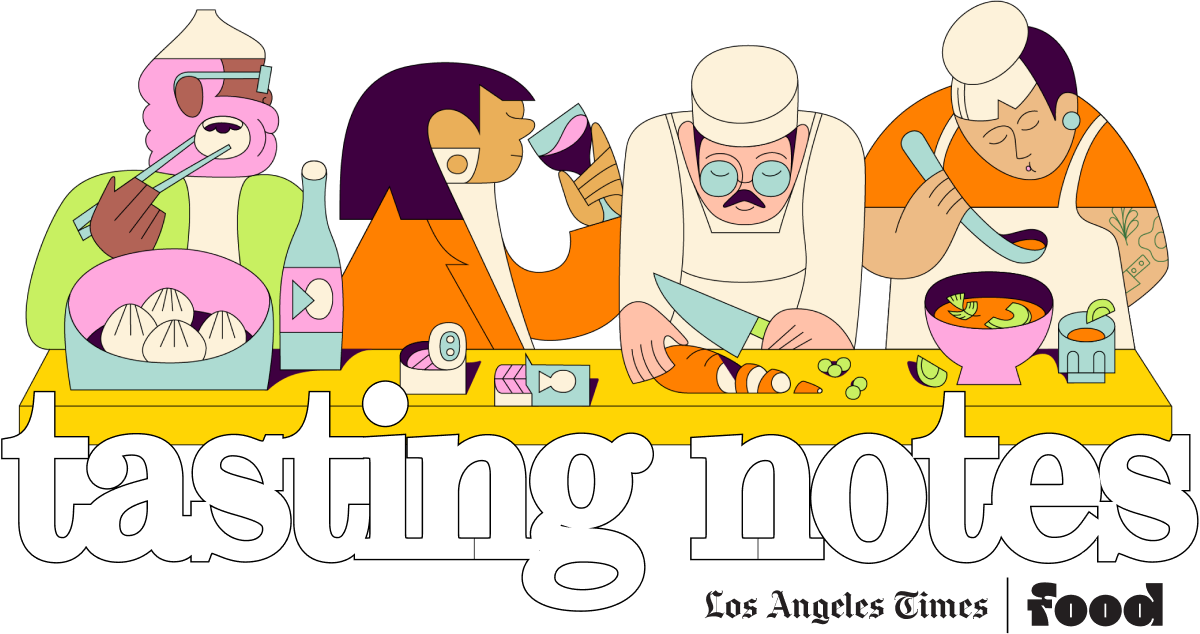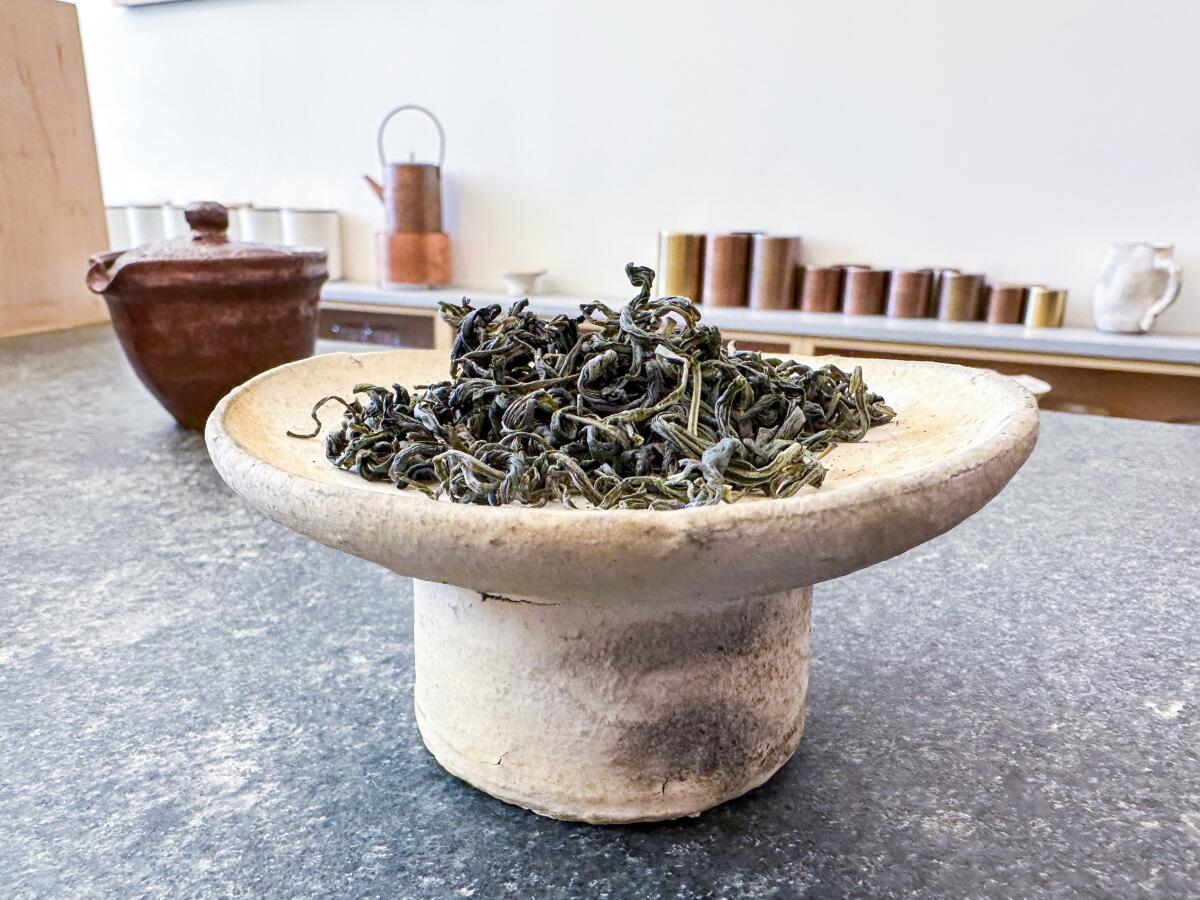If you consume tea with any sort of interest, maybe you’ve been hearing about the worldwide matcha shortage of 2025?
Matcha, but much much more
In short: Viral posts featuring soothingly smooth, mint green matcha drinks on TikTok and other social media over the last few years have ignited a global craze. Coupled with a pandemic-era focus on matcha as an antioxidant-rich superfood that might help prevent cancer and perhaps even improve memory and reduce anxiety, its demand is booming. Industry analysts predict the market size to almost double to $6.5 billion internationally by 2030.
Supplies from tea farmers, and dwindled inventory from distributors, can’t keep pace — especially given labor shortages and a recent heatwave in Japan that decreased yields of tencha, the traditional variety of shade-grown tea which is powdered into matcha. Many companies, small and large, that sell matcha have attempted to stockpile their reserves. Wholesale prices this year have increased by a staggering 265%, according to the International Tea Co.
Walk with this knowledge into Kettl, a new Japanese tea cafe and shop in Loz Feliz, and the calmness of the two-story space feels all the more remarkable.
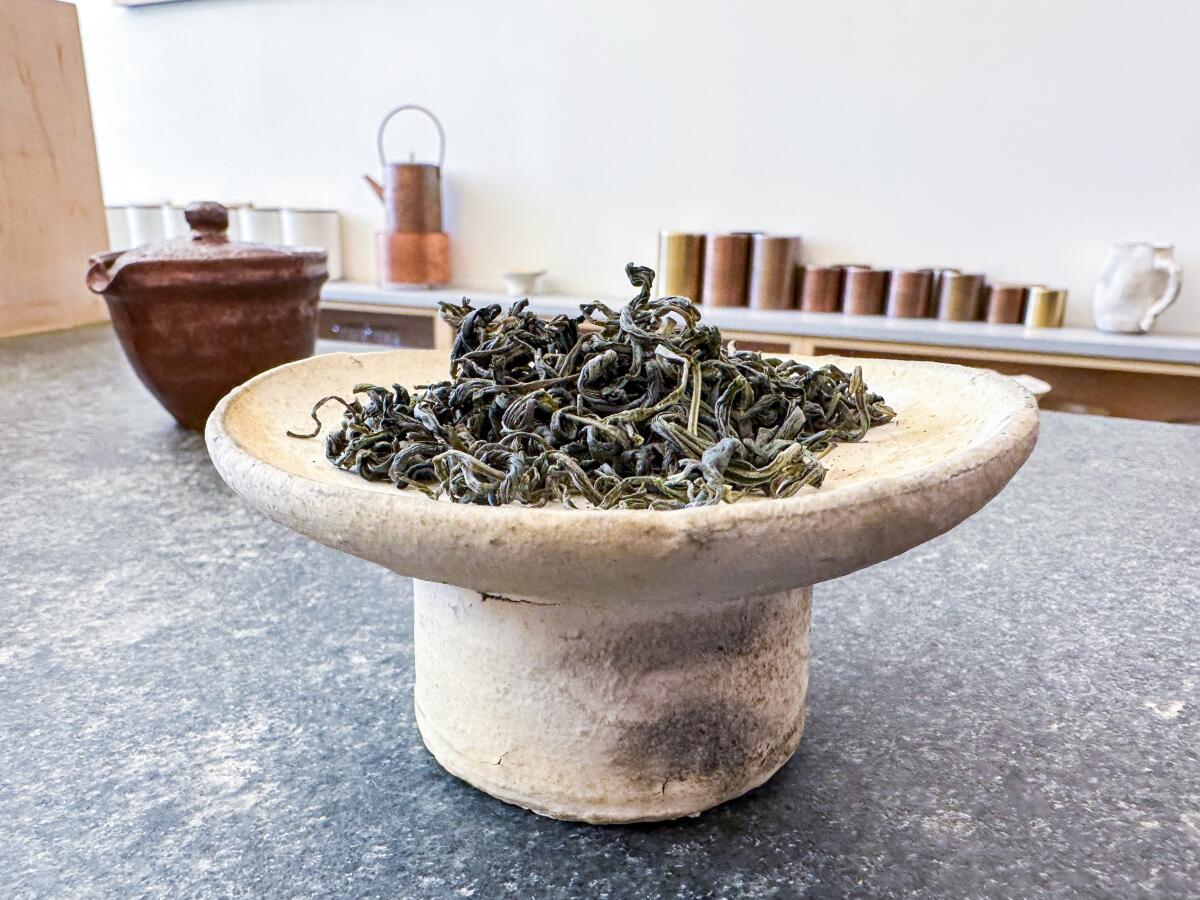
Leaves of Koju oolong, grown in Japan, before a tasting at Kettl in Los Feliz.
(Bill Addison / Los Angeles Times)
No sense of scarcity here. Order a matcha cortado to drink on premises and it arrives in a gorgeously coarse ceramic cup, the tea decorated with the requisite foam art. Choose from three matcha varieties for your latte: nutty and chocolaty, creamy and floral, or umami-intense. Ask for whisked matcha with options in a similar range of flavors. Grab a cooling matcha splashed with sparking water over ice to go.
Or, stick around for a tasting with schooled staffers who can guide you through wider nuances of matcha — and, even better, to a world of Japanese teas far greater than the current object of focus. This is why I’ve become a regular at Kettl.
Zach Mangan was a jazz drummer in his twenties in the 2000s when, on tour in Paris, he happened upon a store selling sincha, the prized tea made from the first spring harvest in Japan.
“The smell of the glossy, needlelike leaves was incredibly nostalgic, though I had never experience it before,” he writes in his 2022 book, “Stories of Japanese Tea.” “It reminded me of the lawn of my childhood home when freshly mowed. I brewed it and was captivated by how much flavor was packed inside my tiny cup of tea.”
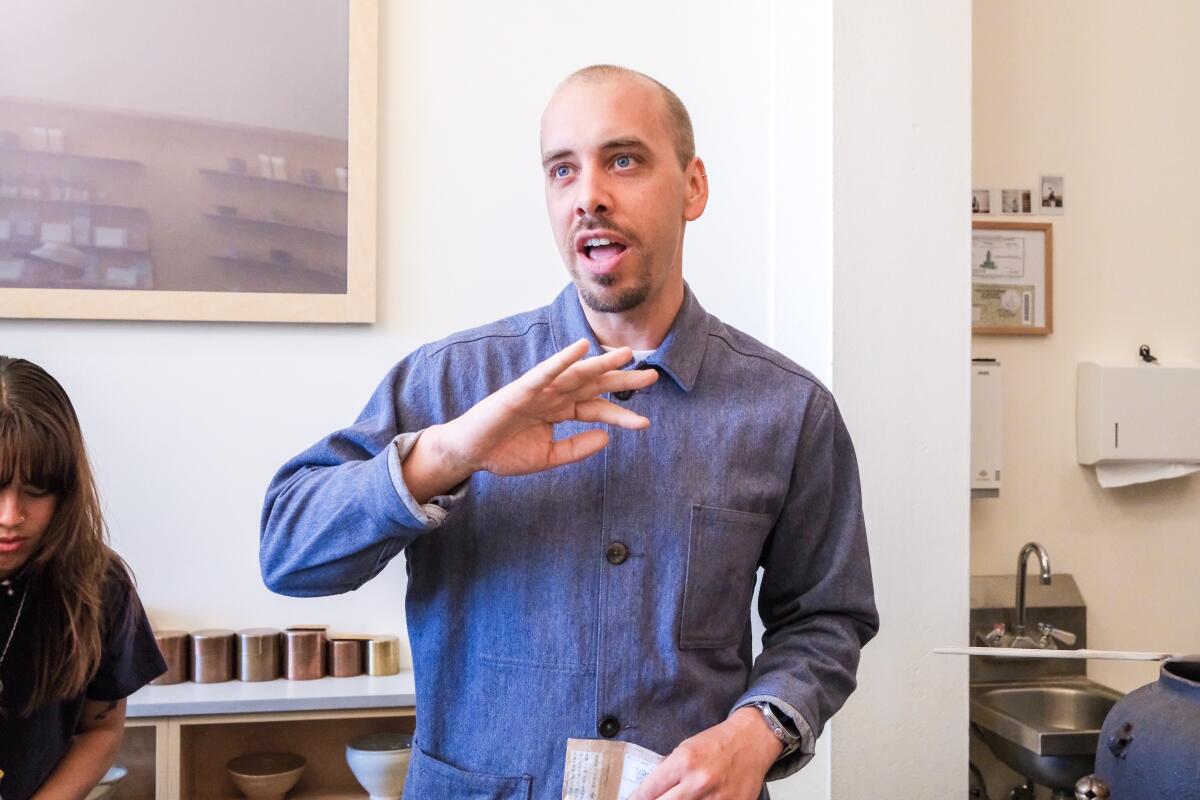
Kettl founder Zach Mangan talks tea behind the counter of his new Los Feliz shop.
(Bill Addison / Los Angeles Times)
The experience led down one path after another: A job at a now-closed tea shop in New York called Ito En. A first monthlong trip to Japan in 2010, where he understood the degrees to which freshness can take green teas from pleasant to electric. A series of return visits in which he developed relationships with tea producers so he could become an importer.
His first client, from a cold call, was renowned chef David Bouley. Other chefs began buying. He and his wife, Minami Mangan, opened the first Kettl shop in Greenpoint, Brooklyn, in 2021.
Their Los Angeles location, delayed for several years by a familiar litany of permit and buildout hurdles, steeped their first teas for customers in February.
The state of L.A.’s sit-down tea scene
As a mid-level tea obsessive, I’d say the culture around drinking serious tea in public spaces in Southern California remains niche. No insult intended to matcha and boba shops: I’m talking about places for a face-to-face, sit-down shared experience between the tea brewer and the drinker. I’ve written plenty about Alhambra’s by-appointment-only Tea Habitat, my favorite place in the country for dan cong, the exceptionally fragrant oolongs from the Phoenix Mountain region in China’s Guangdong province.
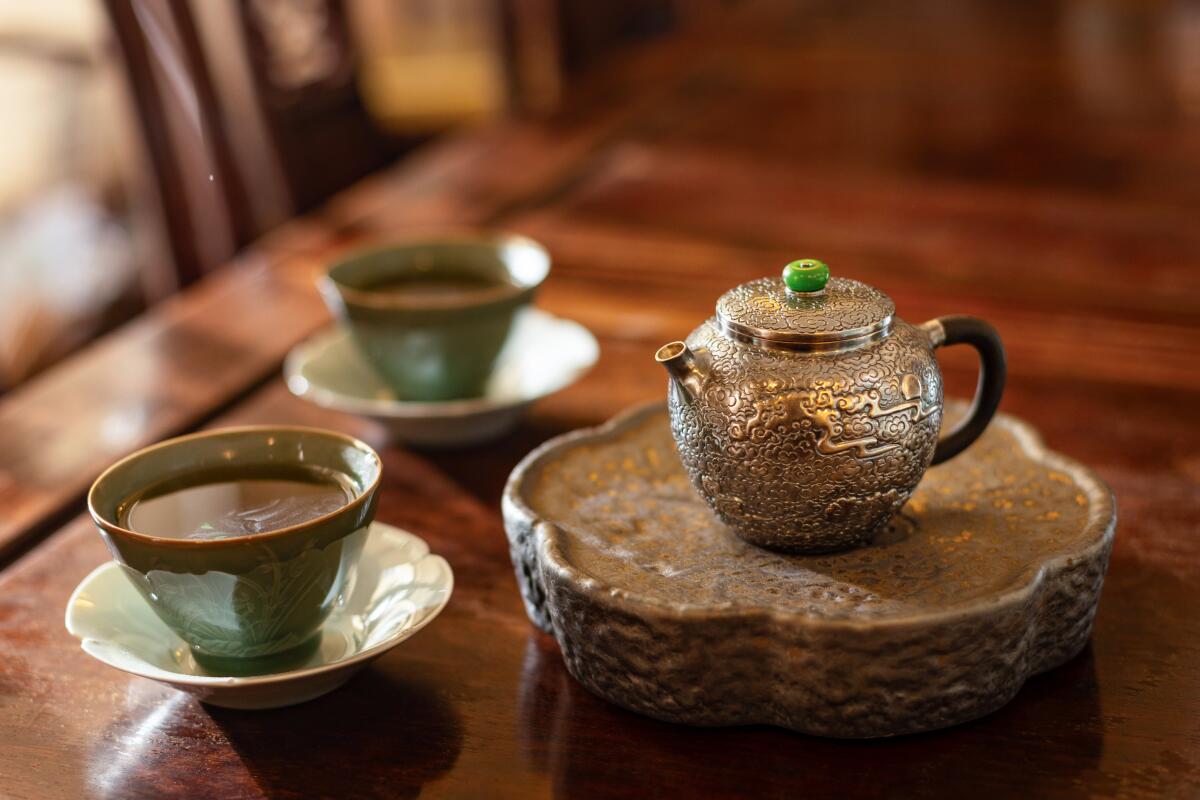
A tasting at Tea Habitat in Alhambra.
(Jason Armond / Los Angeles Times)
Tomoko Imade Dyen, a Tokyo-born Angeleno who works as a PR consultant and television producer, holds occasional, enlightening Japanese tea tastings with seasonal foods. The Good Liver store in downtown L.A. also holds regular tastings and carries premium matcha that tends to sell fast.
Kettl and its serene, sunny rooms, in this context, feel extravagant. There are ticketed classes, held upstairs, which teach the basics of, say, making iced matcha in summertime, but I’m most drawn to the four-seat tasting bar to the right of the ordering counter. On weekends it’s wise to reserve seats, but I’ve had luck slipping in on weekday afternoons. A staffer will hand you a menu booklet outlining options: bowls of first-rate matcha that begin at $15; pots of other teas, which include multiple steepings, starting at $10; an in-depth tea omakase starting at $70 per person.
I’m happy whisking matcha for myself at home. Drinking in the shop, I’m curious about sencha, the broadest category of green teas produced in Japan. Mangan likens the diversity of styles made under the term to the wild differences between all red wines bottled across France, or whiskies distilled in Scotland.
When he was in town last month, he brewed two for me at the bar. Hachiju Hachiya from Yame — a city on Japan’s Kyushu island so famous for tea that green fields show up at the top of a Google search — was herbaceous but also tasted like popping edamame pods as a snack at a sushi bar.
Hatsutsumi, grown 20 miles away deep in the mountains of the Fukuoka prefecture, smelled like one of those March mornings in Los Angeles after the rain when the city’s terrain rushes into urgent bloom. The texture was almost buttery.
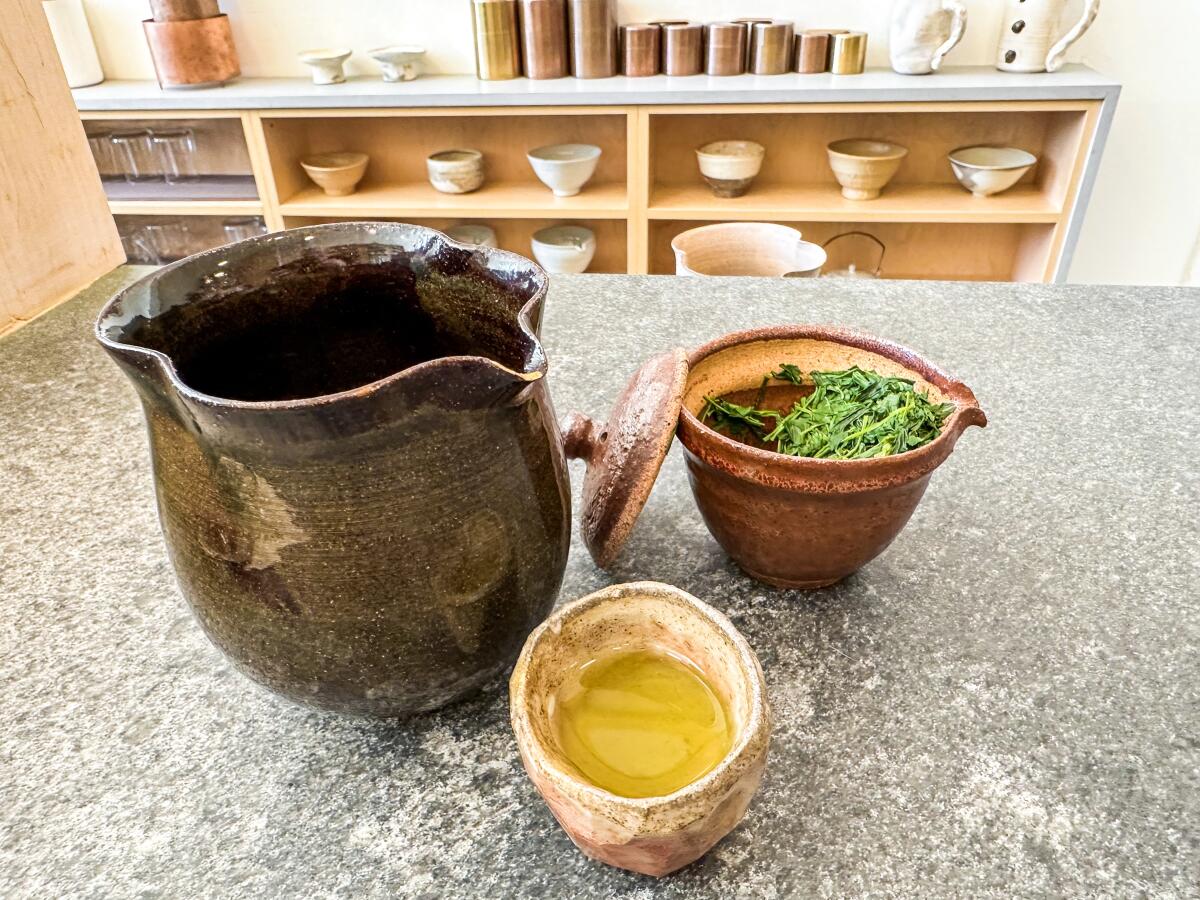
A steeping of gyokuro, a Japanese shade-grown green tea, at Kettl in Los Feliz.
(Bill Addison / Los Angeles Times)
Kettl receives weekly shipments from Japan, so the possibilities are always changing. This past week I drank a rare gyokuro (tea that undergoes a specific, laborious shaded process for three weeks before harvesting; it’s steeped with lots of leaves at unusually cool temperatures) with specific, sweet seashore aromas emblematic of its style.
“The tasting notes were so enthusiastic on this one, I knew Zach wrote them,” joked Ashley Ruiz, who was brewing that day. The taste reminded me, wonderfully, of crabmeat. And I’ve had very few Japanese loose-leaf oolongs; Ruiz suggested one that was light and expressive, with stone fruit flavors knocking about.
There is so much more to return for. It’s promising to witness the shop’s steady foot traffic, and the groups of people lingering in conversation over tea. Maybe it’s matcha mania … and maybe Kettl is nudging L.A.’s tea culture in magnetic new dimensions.
Kettl: 4677 Hollywood Blvd., Los Angeles, (323) 407-6155, kettl.co
Newsletter
You’re reading Tasting Notes
Our L.A. Times restaurant experts share insights and off-the-cuff takes on where they’re eating right now.
You may occasionally receive promotional content from the Los Angeles Times.
Early bird tickets
VIP tickets (allowing early entry) to The Times’ Food Bowl Night Market, presented by Square, are already sold out for the Saturday-night session taking place Oct. 11 at City Market Social House in downtown L.A. Friday-night VIP tickets are still available, but going fast. More than 40 restaurants are participating, including Holbox, Baroo, the Brothers Sushi, OyBar, Heritage Barbecue, Crudo e Nudo, Hummingbird Ceviche House, Rossoblu, Perilla LA, Evil Cooks, Villa’s Tacos, Holy Basil and Luv2Eat Thai Bistro. Check lafoodbowl.com for tickets and info.
Also …
Newsletter
Eat your way across L.A.
Like what you’re reading? Sign up to get it in your inbox every week.
You may occasionally receive promotional content from the Los Angeles Times.
